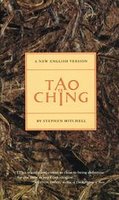
Tao Te Ching roughly translated as the 'The Way & It's Virtue' was written by Lao-tzu in around 600 B.C.
Lao-tzu, a chinese philosopher & contemprory of Buddha, was considered to be a man of wisdom in his country. Somewhat eccentric in nature, Lao-tzu, talks about the way to enlightenment in a very awkward way. The name Lao-tzu means the old man. Since his childhood he was as wise as any old man & that's why he was named as such.
Tao Te Ching being the only book written by Lao-tzu carries a very strange & interesting story behind it's creation.
Lao-tzu, on the order of king of China was caught on the borders when he was on his last journey towards the Himalayas. The king's order were very clear that Lao-tzu should not be allowed to go untill & unless he writes his teachigs in form of a book. Miserably, Lao-tzu wrote Tao Te ching. But did'nt wrote a single word about Tao(the way) in the whole book.
He starts the book with these sentences:-
The Tao that can be told of is not an Unvarying Tao;
The names that can be named are not unvarying names.
It was from the Nameless that Heaven and Earth sprang;
The named is but the mother that rears the ten thousand creatures,
each after its kind.
On the introductory page Lao-tzu writes:-
My words are very easy to understand ; yet no one under heaven understands them.
The Tao Te Ching can be seen as advocating mostly "feminine" (or Yin) values, emphasising the qualities of water — fluidity and softness (instead of the solid and stable mountain), choosing the obscure and mysterious aspect of things, and controlling things without ruling them, in other words to 'have without possessing'. In this respect, this book can be understood as challenging "male" (or Yang) values such as clarity, stability, positive action, and domination of nature; such values are often referred to as Confucian values. Yet a perfect balance between the Yin and Yang is still encouraged.
Something more of wisdom from the book:-
So a wise leader may say: I practice inaction, and the people look after themselves
Knowing others is wisdom;
Knowing the self is enlightenment.
Mastering others requires force;
Mastering the self requires strength;
The contrast of opposition — i.e. the differences between male and female, light and dark, strong and weak, etc. — helps us understand and appreciate the universe.
The harder one tries, the more resistance one will create for oneself.
When the spring comes, grass grows on it's own.
This book, I love a lot.
No comments:
Post a Comment